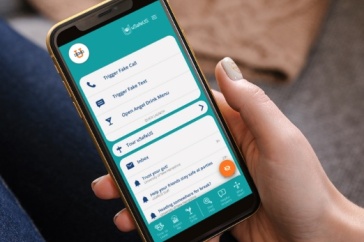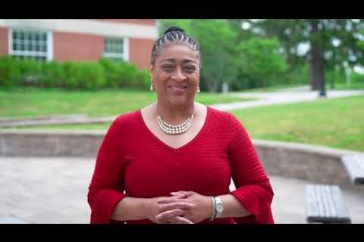
Kirstin Pesaresi (center), president of Stop the Stigma (STS), joins her fellow STS student leaders Jordan Leikin (right) and Tyler Thompson outside Smith Hall, home of the UNH Counseling Center.
Across the nation and on campus here at UNH, counselors are reporting increased requests for mental health services.
“You can’t underestimate the courage of these individuals coming forward,” explains Joan Glutting, clinical associate professor of psychology and interim director of the UNH Counseling Center.
Glutting and Sean Moundas, the center’s assistant director of outreach and assessment, describe the trends they’ve seen since the start of the 2016-2017 academic year and the value of having myriad options available to meet students’ needs.
Kognito by the Numbers
All UNH faculty, staff and students are invited to take the free, online Kognito training through the Counseling Center website.
At UNH, the program is promoted by the Counseling Center and Campus Suicide Prevention Committee and grant-funded by the Substance Abuse and Mental Health Services Administration.
As of early December, several thousand campus members have taken advantage of the various Kognito training options:
- At-Risk Student-to-Student Module: 2,999
- LGBTQ on Campus for Students: 897
- Veterans on Campus for Students: 306
- At-Risk for Faculty/Staff: 1,039
- LGBTQ on Campus for Faculty/Staff: 422
- Veterans on Campus for Faculty/Staff: 385
- Family of Heroes (newest module): 3
Studies show more college students across the country are reporting that they're struggling with anxiety or depression and even thoughts of suicide, Moundas notes.
The need for a range of programs, they explain, is clear, and providing such options is an important part of what the Counseling Center does. Glutting, who recently spoke with New Hampshire Public Radio about the issue, which is impacting campuses across the state, points out that students may report feeling stressed or anxious and needing support. Those needs are always valid but may not equate to a clinical diagnosis, requiring the Counseling Center to provide different approaches to meet student needs, ranging from individual counseling to peer groups.
Among the services available to students at UNH is Stop the Stigma (STS), a student-run organization aimed at providing support to students and increasing awareness and educating the community about mental health and suicide.
For example, STS and LEAD, a new group comprised of students on campus who are also focused on mental health and stigma reduction, collaborated with WildACTS for a presentation in October, Moundas notes.
STS members explain their goal is also to provide a safe space where students can talk with a group facilitator.
Kirstin Pesaresi '18, the group’s president, explains, “STS is a place where people can come together as a group and feel comfortable talking and sharing their feelings about any situation they have been in during their life that has brought them discomfort or pain emotional and physically.”
“On campus, STS is extremely important. We are the only university-supported club that is actively combating the stigma surrounding mental health,” says Jordan Leikin '19, an STS student leader. “The problem is not the diseases; it is the stigma. Too often people feel like they cannot get help or do not need help. While the club is new and still fairly small, there is still so much potential to reach people at every event we attend or help run.”
“A mental health awareness student organization such as Stop the Stigma is crucial to have on any college campus,” agrees fellow STS student leader Tyler Thompson.
Thompson points out that all students have battles to fight, whether mental or physical, and STS members work to emphasize that mental health issues are a problem that should be talked about.
“We are all trained in the Kognito ‘Students at Risk’ program as well, which emphasizes noticing and working/talking with students who may be at risk or are in the midst of a mental-health related battle,” he says.
All UNH faculty, staff and students can take the free, online Kognito training through the Counseling Center website.
“The importance of the group can be found by just analyzing the name,” Thompson says of STS. “If we stop the stigma and break the barrier of starting the conversation about mental health, the ability of communicating emotions amongst us students, and others, will become easier to master.”
Each of the student leaders points to personal reasons why being involved in STS is so important to them.
“STS, for me, is a way to deal with my sister's suicide. No one deserves to feel the pain my sister felt or the pain my family and I felt. Mental illness and suicide changes lives, but a simple conversation can save some heartache or even a life,” explains Leikin.
Pesaresi explains, “I struggle with depression and anxiety. This group is a way for me to make sure that I am doing as much as I can in order to help others who might be in the same situation as I am.
Thompson points to the need students have to be able to communicate about their feelings “without hesitation or consequence.” At STS, he says, that is exactly what happens.
“After losing a close friend to suicide, I decided to actively help the community,” he says, noting the one organization where he could help with the issue of mental health was STS.
As Pesaresi puts it, “The most beautiful thing for me is watching my group interact with each other. Even if we get sidetracked during a meeting, I sit back and observe how much laughter and happiness is being spread. Each person in this group makes me feel so proud, and I am honored to be the president of this club filled with strong and loving individuals.”
Thompson sums up the role STS plays on campus: “We’re our own family of friends and fellow students. All of the members look out for one another and actively pursue making everyone feel welcome.”
Learn more about Stop the Stigma and the other resources available on campus via the UNH Counseling Center website.
-
Written By:
Jennifer Saunders | Communications and Public Affairs | jennifer.saunders@unh.edu | 603-862-3585
















































